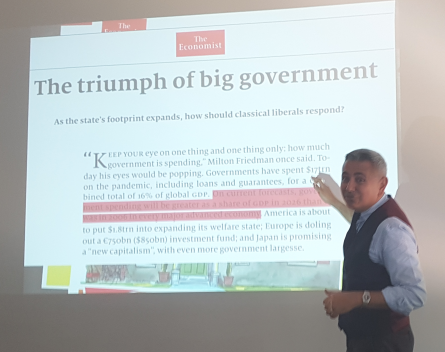Euro-Austerity After COVID-19? Will Europe’s Welfare States Survive … Again?
H. Tolga Bölükbasi of the Department of Political Science and Public Administration at Bilkent University, Ankara, presented his work on the resilience of European welfare states in the face of economic and political challenges at 13.6.2023.
Based on his book „Euro-Austerity and Welfare States: Comparative Political Economy of Reform during the Maastricht Decade“ Prof. Bölükbasi took an in-depth look at the crucial episode of the creation of the Economic Monetary Union (EMU) in the 1990s. During this time European states faced intense pressures to cut their expenditures to fulfil the Maastricht criteria of a total public debt of 60 per cent of GDP and a budget deficit of 3 per cent of GDP. Fulfilling these criteria would allow them to become part of the EMU and eventually become part of the Eurozone. These pressures to cut back expenditures led observers at the time to expect the demise of European welfare states.
Focussing on the three cases, which were farthest away from meeting the Maastricht criteria – Belgium, Greece and Italy – Prof. Bölükbasi explored to what extent governments in these cases retrenched their welfare states. Initially himself convinced that the EMU would cause welfare state retrenchment, Bölükbasi was surprised to find that in the face of domestic opposition to cutbacks governments took back much of their planned reforms. To fulfil the Maastricht criteria without heavy welfare state cutbacks governments had to find alternatives. In the end, governments mostly cut back non-social expenditures, such as defence spending, industrial subsidies, and raised revenues through increasing taxes and privatization receipts.
What does this episode tell us about the pressures that European welfare states are facing post-Covid? During the Covid crisis virtually all governments increased spending. Along with increased spending, budget deficits soared. With increased public debt, calls for austerity were renewed after Covid. So, what will this austerity mean for European welfare states? Based on the EMU experience, H. Tolga Bölükbasi argued that one should refrain from concluding that European welfare states face inevitable cutbacks. Instead, there still remains much room for politics to manoeuvre economic and fiscal pressures without dismantling the welfare state.
Tolga Bolukbasi is an Associate Professor in the Department of Political Science and Public Administration at Bilkent University, Ankara, Turkey. Dr. Bolukbasi’s work cuts across the fields of comparative public policy and comparative political economy. His most recent research explores questions lying at the heart of distributive politics in Turkey in a comparative European perspective.

Kontakt:
Dr. Kerem Gabriel Öktem













